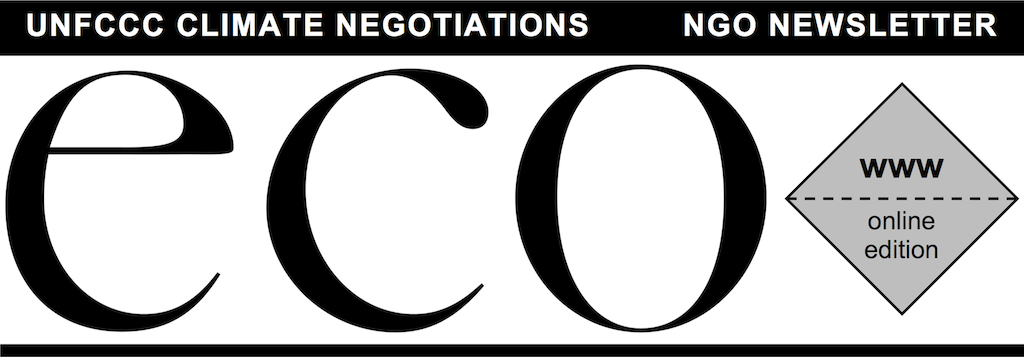Monthly Archive: December 2012
The Doha Decisions
Today is the day to press the reset button. The planet is shouting warning signs at us but the Conference is sleepwalking off the cliff of climate disaster. A political deal was struck in Durban and all need to stand by it.
Ministers, while you bemoan the impending doom in high sounding high-level speeches and promise to do everything within your power to stop it, your negotiators dig in ever deeper in the back rooms of the QNCC.
The Doha deal ECO believes is still within reach would take immediate steps to improve the short-term ambition we urgently need. Your political ambitions need to be matched by targets and pledges more ambitious than the ones currently on offer.
Speaking of pledges: whatever happened to the ambition of the Gulf countries to become climate leaders? What or who is holding them back? Was this the cause of the commotion at the Qatar Airways desk yesterday?
Clearly, much hard work lies ahead to close the growing gigatonne gap. This must start right away with an ambition ‘ratchet’ mechanism (KP) and plan of work with specific milestones (ADP).
Which brings us to the most uncooperative track of all, the LCA. With 53 (!) outstanding issues, this feels like the playroom after a toddler’s birthday party.
... Read more ...
Latin Heat – Dominican Republic Takes it Seriously
To tell the truth, the last couple of days have not seen a lot of Progress, much less Ambition. But along comes something that makes you think there is hope and good will somewhere.
ECO is quietly cheering the rumours of developing countries putting pledges on the table. Today at the High Level Segment, the Dominican Republic pledged an unconditional 25% emission reduction below 2010 levels by 2030 in absolute terms, to be accomplished with domestic funds plus international community solidarity. This is in a national law and therefore mandatory for the government to deliver.
Congratulations to the Dominican Republic for taking serious action on climate change and recall that many other countries are also doing their job. This is the kind of attitude we need in these negotiations to move things forward.![]()
Finance Action
The causes and effects of the global climate storm are dispersed; there is fragmentation and institutional inadequacy. This is true of most global problems, but the factor that really complicates climate action is the spatial and temporal dimensions. The effects of greenhouse gases are not ‘hot spots’ at the source. They are in fact global and the effects are most brutal in areas where emissions are low.
We need to converge our moral and ethical values to tackle this vast problem. The youth organization SustainUS conducted a social experiment on Thursday at the QNCC to test this premise.
Youth representatives asked individuals entering the Conference where they would place their money, were it completely up to them: the Green Climate Fund, Fast Start Finance, Midterm Finance (2013-2020), Military Spending and Fossil Fuel Subsidies.
Each respondent received fake money at the start of the moving walkways from the garage to the QNCC and had to choose along the way where their currency would best be spent. Many dismissed the youth holding the Military Spending and Fossil Fuel Subsidies jars and split their ethical urges between the three climate change finance options.
By the end of the event, the Green Climate Fund was the clear winner.
... Read more ...
Notes from Finance (work in progress)
UK: 1.5bn GBP over 3 years as FSF, to 1.8bn over 2 years, with 50% for adaptation.
Germany: 1.4bn Euros in 2012 to 1.8bn in 2013.
Denmark: 500m DKK for 2013, of which 20% tentatively for the GCF. Maintaining fast start levels of the year 2012.
[The Danish government gave 1.2 billion Danish Kroner in FSF over the years going 300 mil in 2010, 400 in 2011 and ending on 500 mil this year. So the 500 mil for 2013 is keeping the level of this year.]
NB that the UK, Germany, Denmark announcements were from before — it’s just a clarification of what is in their budgets — only new thing is that they have made them public under the COP.
These ones appear right, but are based on reports of what was said during negotiations (ie not exactly formal announcements of
pledges):
Sweden: 2.5bn SEK for 2013 (Swedish NGOs seem to say this is down not up, but we don’t have details)
Canada: Said in the KP that they will continue support for new global initiatives including agriculture and the Arctic (which is not even a developing country!)
Australia: Said would pledge but no numbers.![]()

